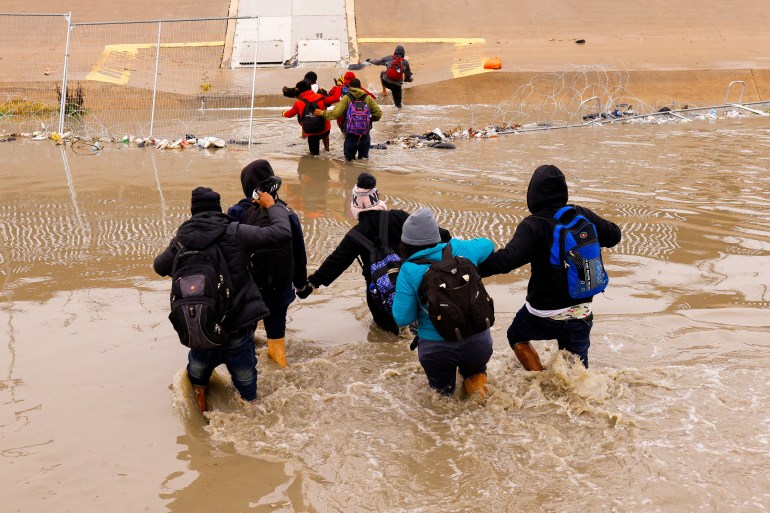US rights groups slam Biden’s ‘unacceptable’ asylum restrictions | Migration News
Migration rights advocates in the United States have condemned the Biden administration’s new border restrictions for asylum seekers, saying the expansion of a contentious expulsion policy put peoples’ lives in danger.
US President Joe Biden unveiled the new measures on Thursday, including the forced return to Mexico each month of as many as 30,000 migrants and refugees from Cuba, Nicaragua, Haiti and Venezuela who come to the US’s southern border in search of protection.
“If you’re trying to leave Cuba, Nicaragua or Haiti … do not just show up at the border. Stay where you are and apply legally from there,” Biden told reporters from the White House, stressing that the new rules aimed to reduce a surge in border arrivals.
Guerline Jozef, executive director of the Haitian Bridge Alliance support group, said on Friday that by urging migrants and refugees to stay where they are, Biden effectively told them to “stay where they are to die”.
“‘Do not come, stay where you are,’ has been a rhetoric of the US government, of the Biden administration, that is unacceptable, that is completely disconnected of the reality of people fleeing to seek asylum,” Jozef told reporters during a press call.
Returning Haitians to Mexico, she added, “where they are unsafe and unable to survive, is unacceptable.”
New rules
The new US immigration rules came amid an increase in refugee and migrant arrivals at the US-Mexico border, which has fuelled a political campaign by Republican legislators who accuse the Biden administration of not doing enough to address the situation.
On Thursday, Biden said the US will allow as many as 30,000 Cuban, Haitian, Nicaraguan and Venezuelan nationals into the country each month and give them two-year work permits. But this process, known as “parole”, will only apply to individuals who have a US-based sponsor to provide financial support and who pass rigorous vetting.
In turn, anyone from the four countries who tries to seek asylum at the US-Mexico border will be turned away and barred from accessing the new programme; Biden said that Mexico agreed to take back 30,000 migrants and refugees monthly from Cuba, Haiti, Nicaragua and Venezuela.
That effectively amounts to an expansion of Title 42, a widely denounced and contentious border policy that allows US authorities to rapidly expel most asylum seekers who arrive at the border in search of protection.
The Biden administration has been ordered to end Title 42 – first invoked in March 2020 under the guise of the COVID-19 pandemic – but it remains in place as the US Supreme Court considers a request by Republican-led states to join a case seeking to keep the restriction in place.
While rights groups welcomed the new parole programme, among other measures announced this week, the expansion of Title 42 drew immediate criticism.
“The administration’s statements seem to assume that coming to the border to seek asylum is not a legal pathway,” Melissa Crow, director of litigation at the Center for Gender and Refugee Studies at UC Hastings College of the Law in California, said during Friday’s news call.
“But under US laws and treaty obligations, people have the right to come to the border and ask for asylum regardless of what country they come from, how they reach US territory, or what documents they hold.”
Washington also signalled that anyone who enters Mexico and Panama without authorisation will be ineligible for the new parole programme, which allows people to enter the US but does not give them a path to permanent status.
That, the Washington Office on Latin America said, “will leave thousands of migrants stranded throughout the route and place additional burden on those countries”.
Savitri Arvey, senior policy adviser at the Women’s Refugee Commission’s migrant rights and justice programme, also pointed out that many people will continue heading towards the border because they cannot afford to wait in their home countries, or will not qualify for the parole scheme.
“This approach does not present a solution — it instead will exacerbate the danger — for many of the most vulnerable individuals in need of our protection,” Arvey said in a statement on Friday.
Regional crises
Gang violence, political instability, and economic crises made worse by the COVID-19 pandemic are among the many factors driving record migrant and refugee arrivals at the US-Mexico border in recent months.
With Venezuela continuing to reel from years of political and socioeconomic insecurity, more than 7.1 million refugees and migrants have been displaced, according to United Nations figures
Economic hardships have fuelled the largest wave of outward Cuban migration in years; Haitians face a surge in gang violence, political instability, and a new outbreak of cholera, and in June, the UN rights chief warned of an “unprecedented” exodus from Nicaragua amid a political crisis there.
While Biden has acknowledged these crises across the region, and promised to take a more human approach to migration than former President Donald Trump, his administration continues to pursue a “deterrence” strategy on migration.
Jozef at the Haitian Bridge Alliance said though she welcomed Biden’s expanded pathways for parole, the US should not close the door to the many asylum seekers who have little choice but to try to seek asylum at the border.
“Now imagine, you are a woman who was raped, fleeing without a passport, in the middle of the Darien Gap,” she told reporters, referring to the popular migration route between Panama and Colombia that is rife with violence and other dangers.
“You do not have a phone. You do not have access to an embassy. How are you going to be able to apply for a programme that is supposed to save your life?”

